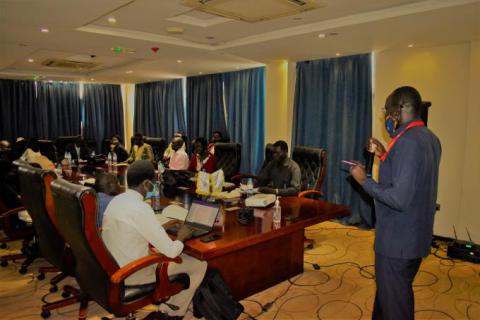Supporting Ratification of the Convention on the Rights of Persons with Disabilities in South Sudan
"Persons with disabilities [are] subjects with rights. They are capable of claiming those rights and making decisions for their lives based on their free and informed consent as well as being active members of the society"
Michael Mabior, Child Rights Governance Program Manager, Save the Children addressing stakeholders during the UNCRPD lobby meeting in Juba. Photo: Daniel Danis/Save the Children
Juba, South Sudan - Save the Children and its partners are calling on members of the newly established South Sudan national legislature to ratify the Convention on the Rights of Persons with Disabilities as a step towards establishing an inclusive society.
South Sudan is yet to ratify the Convention on the Rights of Persons with Disabilities despite 5.1% of South Sudanese living with disabilities, according to the Sudan Population and Housing Census, 2008/2009. There are no latest data to estimate current numbers. The underlying causes of disabilities, however, include eye disease, conflict, and poliomyelitis, mental illness, acquired at birth, road accident, animal/snake bite, physical violence and abuse, hypertension as well as HIV/AIDS.
The situation has been worsened by the 2013 and 2016 conflicts, poverty, illiteracy, and varying degrees of negative attitudes. Most People With Disabilities still have limited access to basic social services such as education, healthcare, as well as employment. They also have limited access to information hence being unable to demand for their rights.
“In East Africa, I have learned that only two countries have not ratified the convention and South Sudan is one of them,” said Hakim Cipuounuc, Executive Director of DARD.
On Friday, October 29 2021, the Disables Agency for Rehabilitation and Development [DARD] in collaboration with the Child Rights Coalition [CRC] with support from Save the Children organized a meeting for the ratification of the convention and its optional protocol. The lobby meeting was attended by government officials - including legislators, persons with disabilities, and supporting partner organizations - Save the Children and UNICEF. The objective was to establish nationwide contacts for engagement on UNCRPD and sensitize the duty bearers and stakeholders on the convention of persons with disabilities.
Hakim stated that the gathering is to also inform stakeholders on the existing commitment and consult duty bearers on the future step to speed up the ratification.
The Convention on the Rights of Persons with Disabilities and its Optional Protocol (A/RES/61/106) was adopted on 13 December 2006 at the United Nations Headquarters in New York and was opened for signature on 30 March 2007. There were 82 signatories to the Convention, 44 signatories to the Optional Protocol, and 1 ratification of the Convention.
It is intended as a human rights instrument with an explicit, social development dimension. It adopts a broad categorization of persons with disabilities and reaffirms that all persons with all types of disabilities must enjoy all human rights and fundamental freedoms.
“If we are all included, we can all have exclusive access to resources …and South Sudan can benefit directly and indirectly through the empowerment of disabled persons because an educated person with a disability will still deliver just like an abled person,” Hakim stressed.
The government of South Sudan is mandated to promote and protect the rights of persons with disabilities as affirmed by the Constitutional principle of equality, dignity, and human rights and the protection of rights of Persons With Disabilities. However, people with Disabilities still lack access to resources.
“South Sudan has ratified many conventions, but it has left out the people with disabilities. This should have been the first thing because of the nature and history of this country where many people have been disabled by years of war and conflicts and natural causes,” said Samuel Chol Alier, National Child Rights Coalition Coordinator.
According to the Constitution of South Sudan, all rights and freedoms enshrined in international human rights treaties, covenants, and instruments ratified or acceded to by the Republic of South Sudan shall be an integral part of the Bill of Rights.
It mandates all levels of government to guarantee to persons with special needs participation in society and the enjoyment of rights and freedoms set out in the Constitution, especially access to public utilities, suitable education, and employment.
The South Sudan National Legislature is the body authorized to ratify international treaties, conventions, and agreements. Hakim Cipuounuc appeals to newly appointed lawmakers to urgently initiate the procedure for the ratification of the Convention on the Rights of Persons with Disabilities and its Optional Protocol.
“We need to have meaningful engagement with our lawmakers so that we can have a voice in our laws. We need also to have knowledge on our rights and also respect the rights of others so that we are also accorded with those respect to hear our voices and respond with positive responses,” he stated.
For his part, Save the Children’s Child Rights Governance Program Manager said "supporting the plight of people with disabilities is key in achieving sustainable and inclusive development in South Sudan."
Michael Mabior Mading affirmed Save the Children’s commitment to ensure local organizations are supported in mobilizing legislators to ratify the Convention.
“This is to ensure that the government…meets its obligation in the promotion, protection and ensuring the full and equal enjoyment of all human rights and fundamental freedoms by all persons with disabilities, and to promote respect for their inherent dignity,” Mabior stated.
Save the Children supports the Child Rights Coalition, a coalition of 36 agencies working for the rights of the children in South Sudan.
Written by Daniel Danis/Save the Children
Edited by Tito Justin/Save the Children
 South Sudan
South Sudan 